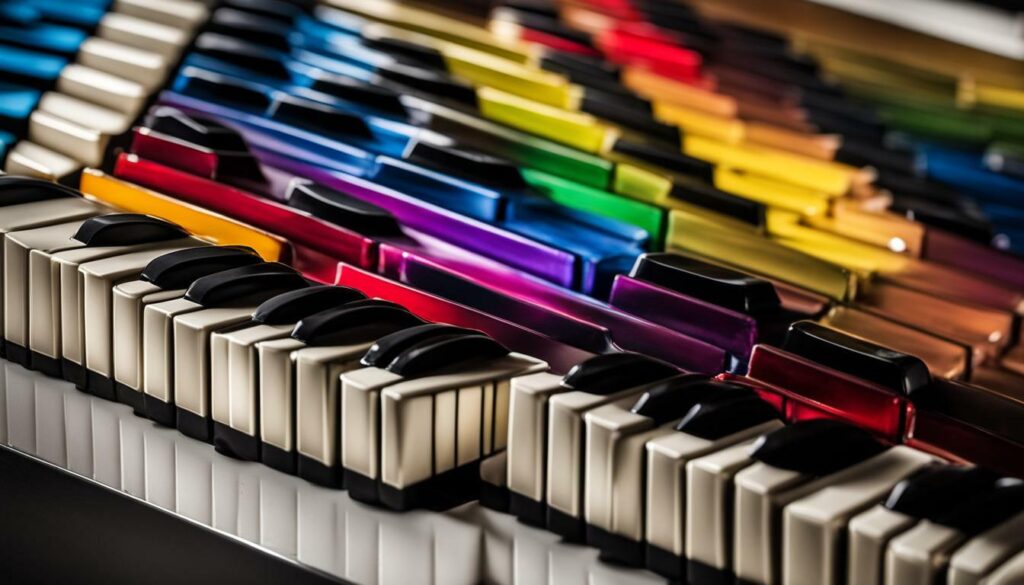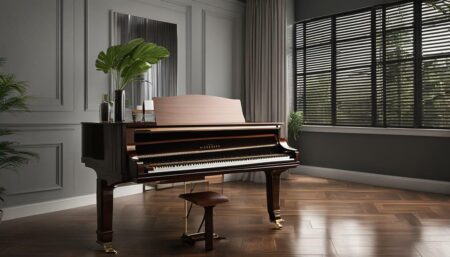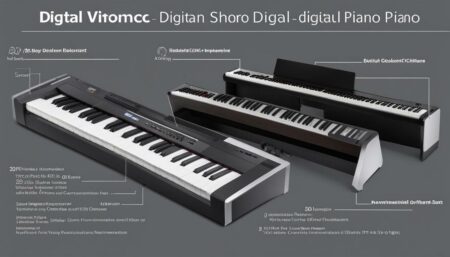Are you looking to take your piano playing to the next level? Do you want to experience the authentic feel of playing a real piano? Look no further than weighted piano keys!
Weighted keys mimic the weight and resistance of traditional acoustic piano keys, offering a realistic touch that allows for precise control of dynamics and sound. Whether you’re a beginner or an experienced pianist, playing on a piano with weighted keys can transform your musical journey and enhance your performance.
- Weighted keys provide a realistic touch that mimics traditional acoustic piano keys
- Playing on a piano with weighted keys can enhance your musical performance and technique
- Weighted digital pianos offer the convenience of digital technology with the authentic feel of acoustic pianos
- When selecting a piano with weighted keys, it’s essential to consider key action and touch sensitivity
- Proper maintenance is crucial to ensure the longevity and performance of your weighted keys
Understanding Weighted Piano Keys
Have you ever wondered why professional pianists insist on playing on weighted keys? The answer lies in the weight and resistance of traditional acoustic piano keys. As a pianist, you need to be able to accurately express dynamics and control the sound. Weighted keys offer the realistic touch required to accomplish this feat.
Weighted piano keys are designed to replicate the feel of a traditional piano keyboard. They offer resistance while playing, allowing you to press down on keys with varying degrees of force, creating a more expressive performance. This responsiveness is achieved by adding extra weight to the keys. The additional weight simulates the feel of an acoustic grand piano, where the hammers strike the strings with a certain amount of force.
Heavy piano keys, sometimes referred to as semi-weighted or graded keys, are a common type of weighted key used in digital pianos. They offer a similar experience to weighted keys, but require slightly less pressure to play. Semi-weighted keys are generally less expensive to produce, making them a popular option for entry-level digital pianos.
Now that you understand what weighted piano keys are and why they matter, let’s take a closer look at the benefits they offer.
The Benefits of Weighted Keys
If you’re serious about playing the piano, investing in a weighted key piano is a wise choice. Not only do weighted keys provide a more realistic and authentic playing experience, but they also offer numerous benefits to pianists of all levels.
One of the most significant advantages of playing on a piano with weighted keys is the improvement in finger strength and technique. The weight and resistance of the keys require more precision and control, allowing pianists to develop their skills and play with greater accuracy.
Additionally, weighted keys provide touch sensitivity that allows for dynamic expression. This is especially important for playing pieces that require variations in volume and intensity. The response of the keys on a weighted key piano allows for seamless transitions between soft and loud notes, enabling pianists to create a more nuanced and emotional performance.
When it comes to choosing the best weighted piano keys, there are numerous options available. It’s essential to consider factors such as key action, touch sensitivity, and overall feel. Some of the best weighted piano keys on the market include the Yamaha Arius series, Kawai ES8, and Roland RD-2000.
Whether you’re a beginner or an advanced pianist, playing on a piano with weighted keys can take your musical journey to the next level. With the improved technique, dynamic expression, and authentic feel, you’ll create music that resonates with your emotions and touches the hearts of your listeners.
If you’re looking for a convenient way to experience the authentic feel of a traditional acoustic piano, consider investing in a weighted digital piano. These instruments combine advanced sound technology with the realistic touch of weighted keys, offering a wide range of features and settings to enhance your playing experience.
With weighted keys, you can control the dynamics and expression of your playing, allowing for a more nuanced and emotive performance. Additionally, many models offer a range of customizable settings, such as different piano sounds, effects, and even recording capabilities.
One of the main benefits of a weighted digital piano is its versatility. It can be played with headphones, allowing for private practice sessions without disturbing others. Many models are also portable and lightweight, making them ideal for gigging musicians who need to transport their instrument to different locations.
When it comes to choosing a weighted digital piano, there are many options available. Look for models with a responsive key action and touch sensitivity that suits your playing style. Also, consider the overall feel of the instrument and whether it provides the sound and features you need to enhance your musical journey.
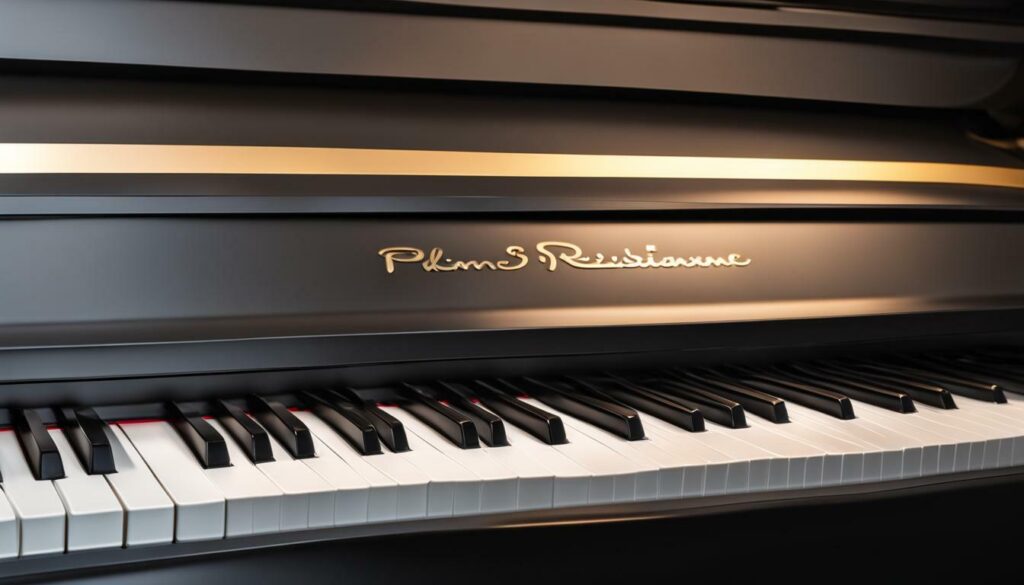
Whether you’re a beginner or a seasoned pianist, a weighted digital piano can provide a convenient and enjoyable way to experience the authentic touch and sound of a traditional piano. Try one out today and elevate your playing to the next level.
Choosing the Best Weighted Piano Keys
When it comes to selecting the best weighted piano keys, it’s important to consider various factors to ensure you find the right instrument that suits your playing style and preferences.
First and foremost, key action should be a top consideration. The weight and response of the keys play a crucial role in the overall feel of the instrument. Models with graded hammer action, for example, mimic the touch of acoustic pianos, with heavier keys in the lower registers and lighter keys in the higher registers.
Touch sensitivity is another important factor to consider. Pianists often prefer instruments that are highly responsive to touch, allowing them to achieve the desired dynamics and expressiveness in their playing.
Other considerations include the sound quality, the number of voices available, and additional features such as recording and playback capabilities.
Some of the best weighted piano keys in the market include the Yamaha P-125 Digital Piano, the Kawai ES110 Digital Piano, and the Roland RD-2000 Stage Piano. Each of these models offers an excellent balance of touch, sound, and features.
If you’re looking for a standalone weighted keyboard, the Korg SV-2S 73-Key Stage Vintage Piano is an excellent option for its authentic piano sounds and vintage styling.
Remember, when searching for the best weighted piano keyboard, it’s always best to try out multiple models to determine which one suits your preferences and playing style the most.
Enhancing Your Musical Journey
Playing on a piano with weighted keys can transform your musical journey. Whether you’re a beginner or an advanced pianist, the responsive touch and authentic feel will inspire you to explore new musical possibilities. With weighted keys, you can express yourself fully and create beautiful melodies that resonate with your emotions.
| Benefits of Weighted Keys for Piano: |
|---|
| Develop finger strength, technique, and control |
| Enable pianists to play with precision and expression |
| Allow for seamless transition from practicing on a digital piano to performing on an acoustic piano |
Whether you’re playing classical music, jazz, or pop songs, the authentic feel of weighted keys enhances the experience and makes it more enjoyable. As you advance in your piano skills, you’ll appreciate the nuanced and subtle differences that weighted keys provide.
The Evolution of Weighted Piano Keys
Weighted piano keys have come a long way in their development. From the early stages of synthesizers and electric pianos, manufacturers have been striving to create a more realistic touch and feel in their instruments. The Yamaha Corporation introduced the first weighted digital piano, the Clavinova, in the 1980s, revolutionizing the industry and paving the way for further advancements.
Over the years, weighted key technology has improved significantly, with enhanced sensors and mechanics providing a more accurate replication of acoustic piano touch. Today, the best weighted piano keys on the market offer superior responsiveness and sensitivity, with some even incorporating the use of synthetic ivory for added authenticity.
The evolution of weighted piano keys has made it possible for musicians worldwide to experience the same realistic touch and feel of a traditional acoustic piano in a digital instrument. With the advancements in technology, it’s easier than ever to find a high-quality weighted piano keyboard that fits your playing style and preferences.
Whether you’re a beginner or an experienced pianist, playing on weighted keys can provide a more engaging and immersive experience, helping you to reach new levels of musical expression. The continuous innovation in weighted key technology ensures that pianists of all levels will continue to have access to high-quality instruments that recreate the authentic feel of playing a real piano.
Tips for Caring for Weighted Keys
Proper maintenance is essential to ensure the longevity and performance of your weighted keys. Here are some tips to help you care for your instrument:
| Tips | Explanation |
|---|---|
| Keep it clean | Dust and wipe your piano keyboard regularly with a soft, dry cloth to remove any dirt or debris. Avoid using harsh chemicals that can damage the keyboard surface. |
| Store it properly | When not in use, cover your piano with a protective case or cloth to prevent dust and scratches. Avoid exposing it to extreme temperatures or humidity, as this can damage the keys and cause them to stick. |
| Avoid spills and moisture | Avoid drinking or eating near your piano to prevent spills or moisture from damaging the keys. In case of any spills, immediately dry the affected area with a clean cloth. |
| Get it serviced regularly | Regularly service your piano with a professional technician to ensure that all the parts are working correctly. They can also clean and regulate the keyboard to keep it in optimal condition. |
By following these tips, you can maintain the functionality and condition of your weighted keys, so they continue to bring you joy for years to come.
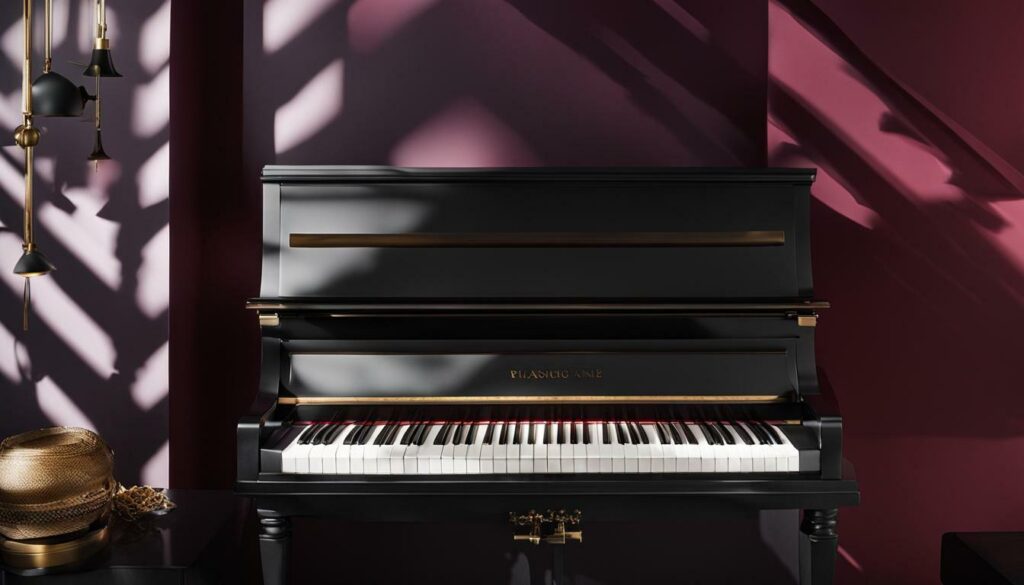
Adjusting to playing on weighted keys can take some time, but with practice and persistence, you’ll quickly adapt to the additional resistance and weight. Here are some tips and techniques to help you develop your skills and maximize your playing potential:
- Take your time: Don’t rush when playing on weighted keys. Allow yourself to feel the weight and resistance of the keys, and focus on developing the right technique.
- Practice regularly: Consistent practice is essential for developing your finger strength, technique, and control.
- Use proper posture: Sit up straight with your feet flat on the ground and your wrists level with the keys. This posture will help you play with ease and prevent fatigue or injury.
- Experiment with dynamics: Weighted keys allow you to express a wide range of dynamics. Experiment with playing softly and loudly, and learn how to control the sound with your fingers.
- Try different playing styles: Weighted keys can replicate the feel of different types of pianos, including grand and upright pianos. Try out different playing styles and techniques to find what works best for you.
By incorporating these tips into your practice routine, you’ll quickly adapt to playing on weighted keys and enhance your playing potential.
Playing on weighted keys isn’t just about developing finger strength and control. It’s also about exploring new musical territory and expanding your repertoire. Whether you’re a classical pianist, a jazz enthusiast, or a pop musician, weighted keys can help you achieve a more nuanced and expressive performance.
With the authentic feel of weighted keys, you can experiment with dynamics, phrasing, and articulation, bringing your musical ideas to life. Try playing with different tempos, using rubato to create a sense of fluidity, or exploring the pedal to enhance your sound. You’ll be amazed at how much more control you have over the music.
If you’re looking to improve your technique or tackle more challenging pieces, weighted keys can help. With their responsive touch and precise control, you can practice with greater accuracy and precision, perfecting your playing skills in less time.
“Playing on weighted keys opens up a world of musical possibilities.”
There’s no limit to what you can achieve on weighted keys. From Rachmaninoff’s Piano Concerto No. 3 to Stevie Wonder’s “Superstition,” you can tackle any piece with confidence and authority. The authentic touch and feel of weighted keys will give you the edge you need to take your playing to the next level.
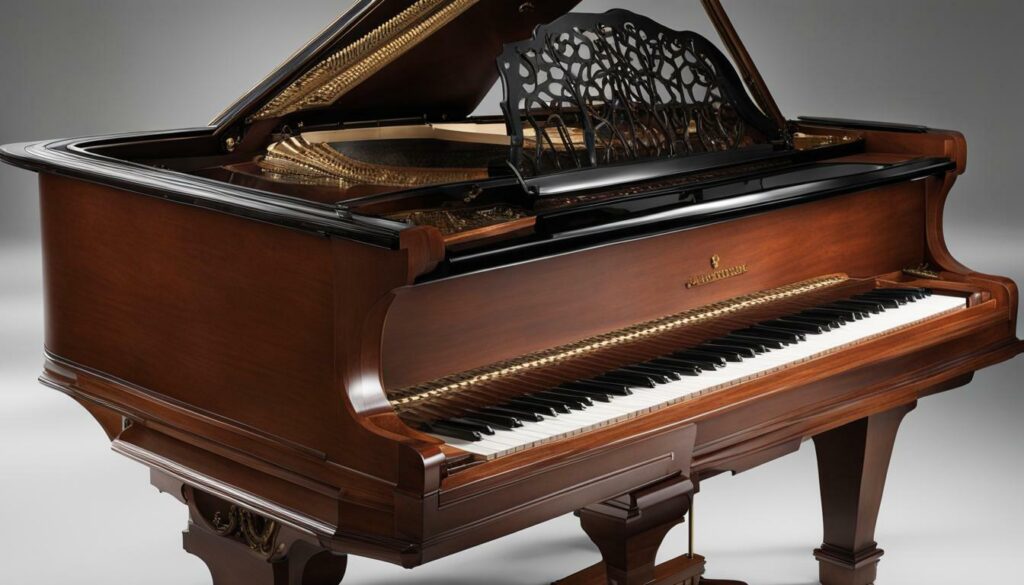
So why not try playing on a piano with weighted keys and see where it can take you? You may be surprised by how much more expressive and musical you become. Whether you’re just starting or looking to expand your horizons, weighted keys are an essential tool for any pianist looking to unlock their true potential.
Conclusion
Weighted piano keys offer an incredible playing experience that brings you closer to the authentic feel of playing a traditional acoustic piano. Whether you’re a beginner or an advanced pianist, incorporating weighted keys into your musical journey can help you develop your skills, enhance your technique, and express yourself fully.
Choosing the right piano with weighted keys can be daunting, but by considering factors such as key action, touch sensitivity, and overall feel, you can find the instrument that best suits your playing style and preferences. With advancements in technology, you don’t have to sacrifice the convenience of a digital piano for the realistic feel of acoustic keys. Weighted digital pianos offer the best of both worlds, providing a wide range of sounds, customizable settings, and features to enhance your playing experience.
Proper maintenance is crucial to ensure your weighted keys continue to bring you joy for years to come. Regular cleaning, proper storage, and avoiding exposure to extreme temperatures can help preserve the functionality and condition of your instrument.
Learning to play on weighted keys may take some time to adjust to the additional resistance and weight. However, with practice and persistence, you’ll quickly adapt and begin to appreciate the benefits they offer. By expanding your repertoire with weighted keys, you can explore various musical genres, experiment with different playing styles, and tackle more challenging pieces with confidence.
Weighted piano keys have come a long way in their development, revolutionizing the digital piano industry and making it more accessible and enjoyable for musicians worldwide. Start your exploration of weighted keys today and unlock the true piano feel.
FAQ
What are weighted piano keys?
Weighted piano keys refer to keys that mimic the weight and resistance of traditional acoustic piano keys. They provide a realistic touch, allowing pianists to accurately express dynamics and control the sound.
Why are weighted piano keys important?
Weighted piano keys are essential for enhancing your musical performance. They help develop finger strength, technique, and control, enabling pianists to play with precision and expression. Additionally, weighted keys allow for a seamless transition from practicing on a digital piano to performing on an acoustic piano.
What are the benefits of weighted keys?
Playing on a piano with weighted keys offers numerous advantages. It helps develop finger strength, technique, and control, enabling pianists to play with precision and expression. Additionally, weighted keys allow for a seamless transition from practicing on a digital piano to performing on an acoustic piano, making them an excellent choice for pianists of all skill levels.
What is a weighted digital piano?
A weighted digital piano combines the convenience of digital technology with the realistic feel of acoustic pianos. These instruments offer a wide range of sounds, customizable settings, and features to enhance your playing experience. With weighted keys and advanced sound technology, you can enjoy the best of both worlds.
How do I choose the best weighted piano keys?
When selecting a piano with weighted keys, it’s essential to consider factors such as key action, touch sensitivity, and the overall feel. Different models offer varying degrees of weight and response, so it’s worth trying out multiple options to find the one that suits your playing style and preferences.
How do I care for weighted keys?
Proper maintenance is essential to ensure the longevity and performance of your weighted keys. Regular cleaning, proper storage, and avoiding exposure to extreme temperatures can help preserve the functionality and condition of your instrument.
How do I adjust to playing on weighted keys?
If you’re new to playing on weighted keys, it may take some time to adjust to the additional resistance and weight. However, with practice and persistence, you’ll quickly adapt and begin to appreciate the benefits they offer.
Can playing on weighted keys expand my repertoire?
Playing on weighted keys opens up a world of musical possibilities. You can explore various genres, experiment with different playing styles, and tackle more challenging pieces with confidence. The realistic feel of weighted keys empowers you to express yourself fully, allowing for a more nuanced and expressive performance.



